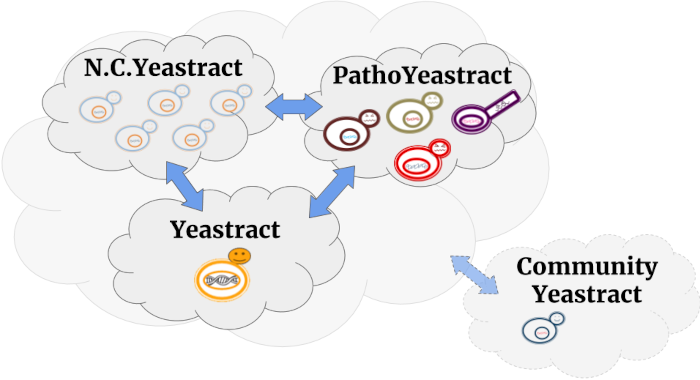Science cluster

Summary
The FAIRY project focuses on enhancing YEASTRACT+, a widely used open-access FAIRsharing Knowledge-base and repository developed by ELIXIR, that supports research on yeast transcriptional regulation. Yeasts are vital organisms in both the bioeconomy, e.g. through the industrial production of food, energy and commodities, and in health research, due to their role as pathogens and model organisms for studying genetics and disease. FAIRY aims to significantly advance scientific understanding of yeast regulatory networks and improve the platform by integrating advanced data analysis tools, ensuring compliance with FAIR principles. By relying on the Galaxy Europe platform for raw data curation, the project will link with the EOSC, increasing the database’s scientific utility and promoting data sharing across disciplines.
Challenge
Open Science project, Open Science Service, Cross-domain/Cross-RI
Despite YEASTRACT+'s role as a leading resource for yeast transcriptional regulation, it currently lacks quantitative gene expression data. Moreover, many yeast species in the database remain poorly characterised, impeding the understanding of their regulatory mechanisms and broader bioeconomic applications. Additionally, many yeast species remain understudied, hindering our understanding of their regulatory mechanisms. The FAIRY project aims to tackle this challenge by incorporating machine learning models trained on cross-species regulatory data, while ensuring that the data remains FAIR.
Solution
FAIRY will develop and integrate tools for quantitative transcriptomics analysis within YEASTRACT+, allowing researchers to identify regulatory interactions and assess their quantitative impact on gene expression levels. The project will rely on the Galaxy Europe platform for raw data curation, in particular large-scale RNA-seq data processing, enhancing the efficiency and scalability of quantitative transcriptomics analysis. Additionally, machine learning models trained on cross-species regulatory data will be employed to predict new transcriptional regulatory rules for transcription factor activity and evolution in poorly-characterised yeasts. To align with the FAIR principles, the project will develop web services, or APIs, enabling seamless data exchange between YEASTRACT+ and major biological databases (such as GenBank, KEGG, MetaCyc, SGD/CGD, and FungiDB), thus enhancing data accessibility, interoperability, and reusability. Researchers will be able to effortlessly access and combine YEASTRACT+ data with information from these complementary resources, fostering a more comprehensive understanding of yeast regulatory networks.

Scientific Impact
By combining data on how genes are regulated and how yeast cells process nutrients, the FAIRY project will improve our understanding of how transcription factors control gene expression and the consequent phenotypic outcome. It will also allow scientists to predict how these regulatory events affect the cell’s metabolism, which is important for optimising yeast-based production processes towards a circular bioeconomy. The project will help researchers identify which genes are essential for the cell's survival, not just in metabolism but also in how genes are regulated. This will expand current tools used for identifying potential drug targets. Typically, each user has to perform these calculations themselves. The FAIRY project will pre-calculate these outcomes for a range of yeast species (currently limited to S. cerevisiae and C. albicans), storing them in a central database. By offering ready-made predictions, the project will make it easier for scientists to reuse the data, speeding up research in designing better yeast strains for industry and finding new antifungal drug targets.
Publications
- Viana R, Couceiro D, Newton W, Coutinho L, Dias O, Coelho C, Teixeira MC. Unveiling new features of the human pathogen Cryptococcus neoformans through the reconstruction and exploitation of a dedicated genome-scale metabolic model. Comput Struct Biotechnol J. 2025 May 23;27:2336-2346, DOI
- Zolotareva M. et al, Fungal DNA-barcoding on a chip: Magnetoresistive biosensors for yeast infection diagnosis, Wiley Online Library, September 2025, DOI
Events
- 16 November 2024 | Lisbon, Portugal - Presentation by Zolotareva M, Cascalheira F, Caneiras C, Bárbara C, Caetano D, Teixeira MC, “Fungal DNA-barcoding on a chip: ITS-DNA biosensors for yeast infection diagnosis” at MicroSummit 2024
- 18-21 March 2025 | Heidelberg, Germany - Presentation by Couceiro D, Viana R, Coutinho L, Oliveira J, Monteiro PT, Teixeira MC, "Computational approaches to find new antifungal molecular targets: mixed regulatory-metabolic models supported by YEASTRACT", at the EMBO | EMBL Symposium - Mechanisms of drug resistance and tolerance in bacteria, fungi, and cancer,
- 23, 26-29 May 2025 | Braga, PortugalCellMeD2 - Invited keynote lecture by Teixeira MC, "Outward and inward drug transport in pathogenic yeasts", at the 2nd Meeting in Cellular membrane dynamics
- 3-7 September 2025 | Stockholm, Sweden - Invited keynote lecture by Teixeira MC, Zolotareva M, Costa I, Silva M, Role - Distribution and regulation of hexose transporters in azole drug resistant pathogenic yeast, at the 40th Small Meeting on Yeast Transport and Energetics (SMYTE)
- 17 September 2025 | Lisbon, Portugal - In celebration of the International Microorganism Day 2025 at Técnico, FAIRY was included in the “Microbiology Route” interactive activity, highlighting the importance of microorganisms in our daily lives, and of computational tools on their exploitation.
- 26 September 2025 | Leuven, Belgium - Teixeira MC presentation "Genome-wide identification of drug resistance and drug targets in pathogenic yeasts, invited seminar" at the seminar event Meet the Jury at KULeuven.
- 28 October 2025 | Online - Invited keynote lecture by Teixeira, M.C, “The Yeastract+ database in its 20th anniversary: a tool for the analysis, prediction and exploitation of gene and genomic regulation in yeasts”, at the BioTools@I4HB workshop
- 4-6 December 2025 | Ponta Delgada, Azores - Set of presentations selected at Microbiotec’25
- Costa IV, Zolotareva M, Horta Maior A, Teixeira MC, “To be or not to bi(ofilm): the influence of mediator-complex subunits in Candida biofilm formation”.
- Couceiro D, Parada C, Val T, Paulo L, Coutinho L, Teixeira MC, Monteiro PT, “Aiming at the automation of genome-wide regulatory model inference and metabolic integration in Saccharomyces cerevisiae”.
- Coutinho L, Andrade J, Teixeira M, Couceiro D, Val T, Paulo L, Sá-Correia I, Monteiro PT, Teixeira MC, “YEASTRACT+ Goes Quantitative: Enabling Advanced Systems Biology through Integration of Transcriptomic Data”.
- Zolotareva M, Cascalheira F, Caneiras C, Bárbara C, Caetano D, Teixeira MC, “Fungal DNA barcoding on a chip - sequence-based fungal infection diagnosis”.
- 12-16 Sept 2026 | Ericeira, Portugal - 40th Small Meeting on Yeast Transport and Energetics, SMYTE - co-organised by project member Miguel Cacho Teixeira. SMYTE, building on four decades of success, promises an exciting and forward-thinking scientific program featuring cutting-edge, unpublished research from leading experts in the field. Plenary and Keynote talks will address pressing biological questions, including those relevant to pathogenic fungi, with implications for global health and biotechnology areas where our community is making significant strides - and where computational tools play an increasingly predominant role.
Principal investigator

Pedro T. Monteiro is an Associate Professor of Algorithms at the CS Department of IST-Universidade de Lisboa and a Researcher at INESC-ID Lisboa.
His current research interests include formal and static analysis of qualitative models of biological regulatory networks. In particular, through the use of formal verification techniques, for the exploration of interesting dynamical behaviours of qualitative biological models.
He is also deeply involved in the continuous maintenance and development of http://yeastract-plus.org , a portal of repositories of regulatory associations of several yeast species.

